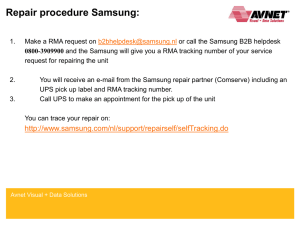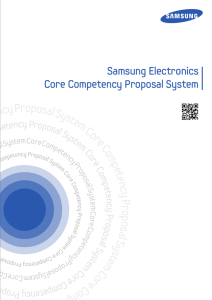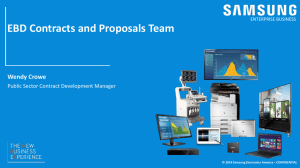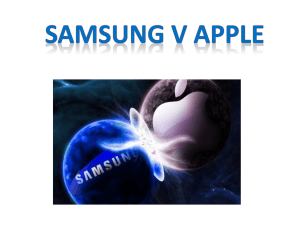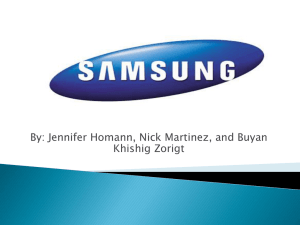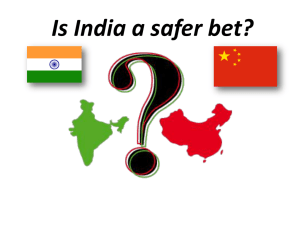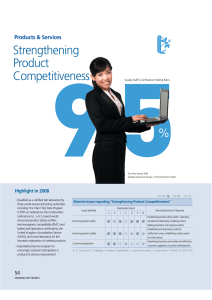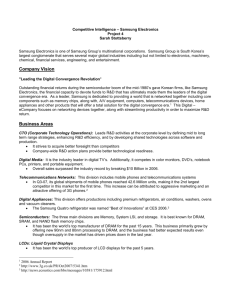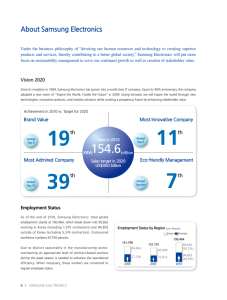Samsung Electronics
advertisement
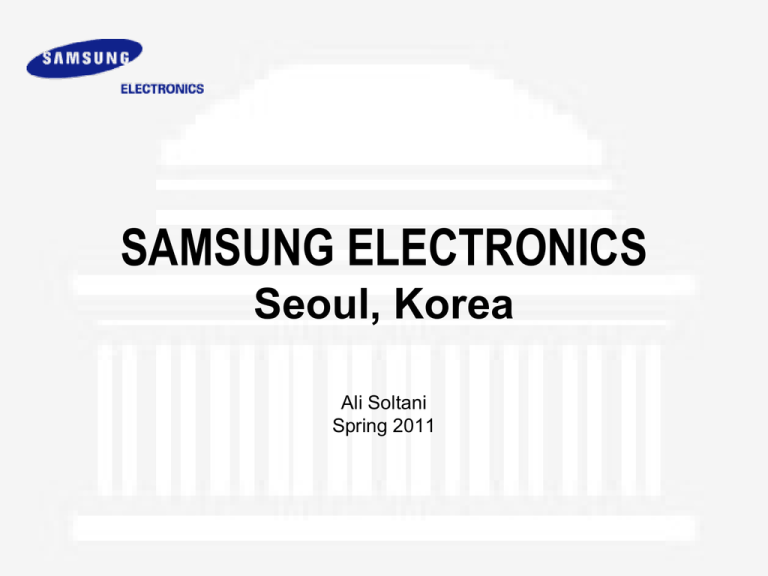
SAMSUNG ELECTRONICS Seoul, Korea Ali Soltani Spring 2011 Agenda • Samsung Group – History & Structure • Samsung Electronics – – – – – – History Company Focus Financial Overview Strategy Organizational Structure Challenges Samsung Group • Founded in 1938 – exporter of dried fish, vegetables, and fruits – flour mill and confectionery machines • 1950’s Economic Stabilization – Korean War - Samsung lost all assets – aimed to help rebuild Korean economy; entered the manufacturing industry (sugar, fabrics) – became a leader in modern business practices (recruiting from outside) • 1960’s Expansion of Key Industries – entered electronics and chemical industries – 1969 established Samsung Electronics Co. Samsung Electronics • Established in January, 1969 • 1970’s: Bet the future on electronics – laid the groundwork for electronics in Korea – helped the domestic economy grow – paved the way for exports • 1980’s: A more comprehensive electronics company – established plants in Portugal and US – established Semiconductor and Communication corporation – began memory chip business • Early 90’s: Integration and Globalization • Mid-Late 90’s: Implementing new management strategies • New Millenium: Digital Vision History 1972 1992 Production of B/W TV sets began Company ranked world’s top DRAM supplier 1969 1980 1995 Company established Korea Telecommunications Corp. acquired TFT-LCD mass production began 1974 1988 1994 Wafer fabrication started Samsung Semiconductor & Telecommunications merged with Samsung Electronics Co. 256Mb DRAM developed 1996 CDMA cellular services commercialized History 2004 S-LCD Corp., LCD joint venture with Sony established World’s 1st to develop and demonstrate Mobile WiMAX 2002 2006 Production using 300mm wafer and 90nm processing technology started 1997 2003 Worldwide Olympic Partner contract signed Company became leader in flash memory World’s 1st Blu-ray Player launched World’s 1st 50nm 1Gb DDR2 DRAM developed 1999 2005 World’s 1st to offer full lineup of digital TVs Developed watch phone, MP3 phone and TV phone World’s 1st Satellite and Terrestrial DMB terminals launched World’s 1st 102”PDP TV, 82”LCD TV, and 71” DLP™ TV developed 2007 World’s 1st 64Gb NAND flash memory developed 2009 ~ 2010 Reorganized into stand-alone businesses Acquired Samsung Digital Imaging Co. Global Network 66 Countries June 2010 Manufacturing Subsidiaries Sales Subsidiaries 33 50 Distribution Centers Design Centers R&D Centers Branch Offices and Other Total Facilities and Offices 2 7 20 81 193 Samsung Today Leader in semiconductor, telecommunication and digital convergence technologies 193 offices and facilities in 66 countries and 174,000 employees worldwide Named one of World’s 50 Most Admired Companies by Fortune Magazine Ranked 4th globally and 1st in Asia among corporations on the Carbon Disclosure Leadership Index Selected for the Dow Jones Sustainability Index Worldwide Olympic Partner since 1997 Second biggest US patent winner in 2009 (IFI) Net Sales (2009): US$116.8 billion Net Income (2009): US$8.3 billion 19th in BusinessWeek/Interbrand’s 100 Best Global Brands Business Units Visual Display Mobile Communications Telecom Systems IT Solutions Digital Appliances Semiconductor LCD Digital LCD Imaging | 9 Financial Performance Strong revenue growth Revenue Net Income (Consolidated basis) (Consolidated basis) (Billion US Dollars) (Billion US Dollars) $8.5 $116.8 $7.5 $105.0 $92.0 $8.3 $7.9 $96.5 $79.6 $4.4 2005 2006 2007 2008 2009 2005 2006 2007 2008 2009 Financial Overview Net Sales Dollars in Bilions 16 14 12 10 8 6 4 2 0 1997 1998 1999 2000 2001 2002 2003 2004 2005 2006 2007 2008 Financial Overview Net Income Dollars in Bilions 16 14 12 10 8 6 4 2 0 1997 1998 1999 2000 2001 2002 2003 2004 2005 2006 2007 2008 Strategy Samsung Market Strategy before 1997 Strategy Strengths Long-time experience in producing technical components and low cost manufactured products for well-known companies. High –quality products Weaknesses Low-price and down-market image Its capital eroded by the Asian financial crisis in 1997 Distribution via discount chain at very low price Communication messages were not consistent due to using so many advertising agencies with more than 20 slogans Strategy • Opportunities – Development of digital technology – New powerful advertising channel: Internet • Threats – The global memory chip market dramatically decreased due to the shrinking demand and excess supply – Chinese cheap products Samsung Market Strategy After 1997 Strategy Digital Vision: “A Company that leads the digital convergence revolution” SOLUTION: 1. 1.Lay off 30,000 employees 2. 2.Close down some of Samsungs factories for 2 month 3. 3.Sold about $2 billion worth businesses (pager & coffeemaker) Design Consumer-brand awareness Global leader in several products High price products Fastest growing brand Brand value : $ 15 Billion Hardware Develop all components used in its own products Strategy 2000 : design-led management 2001 : design labs : Los Angeles , London 2002 : Usability Laboratory 2003 : 33 awards at top design 2006 : market value rises above $100 billion 2007 : world's second-largest Mobile Phone maker 2008 : take the No.1 spot as the world’s largest technology company 2009 : Entered the top 10 list in the world’s top 100 global brands Product Category Market Rank Memory Chips 1 Computer Monitor 1 LCD Display 1 Big Screen TVs 1 DVD-VCR Combos 1 Projection TVs 2 DVD Players 2 Laser Printers 2 Mobile Phones 2 Microwave Ovens 3 Plasma TVs 4 Camcorders 4 Wow Products • “We have to combine computers , consumer electronics and communications as Koreans mix their rice with vegetables and meat” • “We want to be the Mercedes of home electronics” • “They’ve got the products , a growing reputation as the innovator , and production lines to back that up” • Creating chief design office Technological Competitiveness Innovating technologies by sustaining investment in R&D Investment in R&D (Billion US Dollars) $6.0 $6.3 $7.5 $6.2 $5.5 $5.3 2005 R&D Commitment (as a % of parent company sales) 2006 2007 2008 2009 Culture • • • • Entrepreneurial Profit focused Decisive Different from other firms in Korea and within chaebol Thank you
